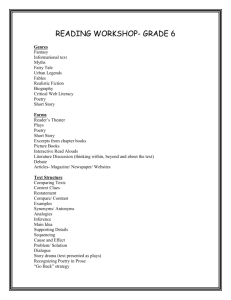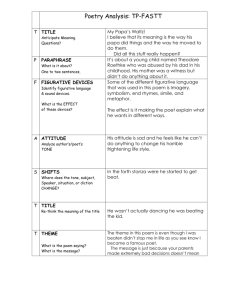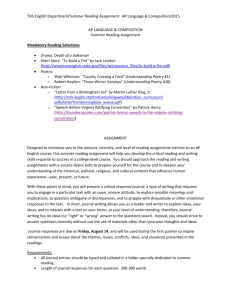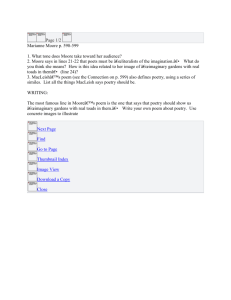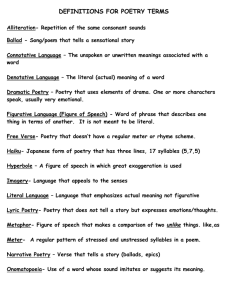Grade: Theme:1 Week:5 Day:1 Text: Poetry Reading Workshop
advertisement
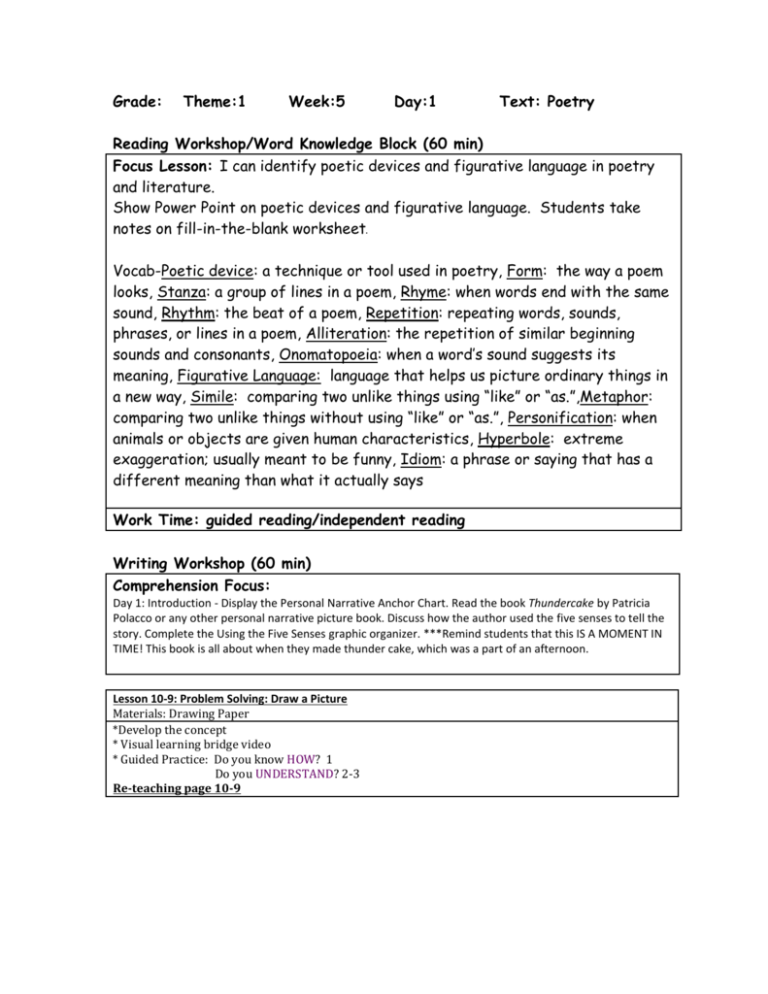
Grade: Theme:1 Week:5 Day:1 Text: Poetry Reading Workshop/Word Knowledge Block (60 min) Focus Lesson: I can identify poetic devices and figurative language in poetry and literature. Show Power Point on poetic devices and figurative language. Students take notes on fill-in-the-blank worksheet. Vocab-Poetic device: a technique or tool used in poetry, Form: the way a poem looks, Stanza: a group of lines in a poem, Rhyme: when words end with the same sound, Rhythm: the beat of a poem, Repetition: repeating words, sounds, phrases, or lines in a poem, Alliteration: the repetition of similar beginning sounds and consonants, Onomatopoeia: when a word’s sound suggests its meaning, Figurative Language: language that helps us picture ordinary things in a new way, Simile: comparing two unlike things using “like” or “as.”,Metaphor: comparing two unlike things without using “like” or “as.”, Personification: when animals or objects are given human characteristics, Hyperbole: extreme exaggeration; usually meant to be funny, Idiom: a phrase or saying that has a different meaning than what it actually says Work Time: guided reading/independent reading Writing Workshop (60 min) Comprehension Focus: Day 1: Introduction - Display the Personal Narrative Anchor Chart. Read the book Thundercake by Patricia Polacco or any other personal narrative picture book. Discuss how the author used the five senses to tell the story. Complete the Using the Five Senses graphic organizer. ***Remind students that this IS A MOMENT IN TIME! This book is all about when they made thunder cake, which was a part of an afternoon. Lesson 10-9: Problem Solving: Draw a Picture Materials: Drawing Paper *Develop the concept * Visual learning bridge video * Guided Practice: Do you know HOW? 1 Do you UNDERSTAND? 2-3 Re-teaching page 10-9 Grade: Theme:1 Week:5 Day:2 Text: Poetry Reading Workshop/ Word Knowledge Block Focus Lesson: I can identify poetic devices and figurative language in poetry and literature. Read Sarah Cynthia Sylvia Stout by Shel Silverstein. Students highlight or underline examples of rhyme, repetition, and alliteration in different colors. Vocab- Poetic device: a technique or tool used in poetry, Form: the way a poem looks, Stanza: a group of lines in a poem, Rhyme: when words end with the same sound, Rhythm: the beat of a poem, Repetition: repeating words, sounds, phrases, or lines in a poem, Alliteration: the repetition of similar beginning sounds and consonants Work Time: guided reading/independent reading Writing Workshop (60 min) Comprehension Focus: Day 2: Show, Not Tell - Discuss the difference between showing and telling by giving examples. Display the Show, Not Tell Anchor Chart. Complete the Show, Not Tell writing practice. Review For Math Test Tomorrow Grade: Theme:1 Week:5 Day:3 Text: Poetry Reading Workshop/Word Knowledge (60 min) Focus Lesson: I can identify poetic devices and figurative language in poetry and literature. Read Polar Bear, Polar Bear (onomatopoeia), Dinnertime Chorus by Sharon Hendricks (personification), and Thanksgiving by Alan Loren (hyperbole). Students will complete example worksheets (onomatopoeia, personification, hyperbole, and alliteration) with a partner or independently. Vocab- Onomatopoeia: when a word’s sound suggests its meaning, Personification: when animals or objects are given human characteristics, Hyperbole: extreme exaggeration; usually meant to be funny Work Time: guided reading/independent reading Writing Workshop (60 min) Comprehension Focus: Day 3: Show Your Feelings - Read the book On Monday When it Rained by Cheryl Keichenmeister or another personal narrative picture book that shows feeling. Complete the Show Your Feelings graphic organizer. Math Test Grade: Theme: Week:5 Day:4 Text: Poetry Reading Workshop/ Word Knowledge Block (60 min) Focus Lesson: I can identify poetic devices and figurative language in poetry and literature. Read Berkley and My Cat by Natasha Niemi (simile) and The Pilot (metaphor). Students complete simile/metaphor activity with My Favorite Day and Cold Winter Day. Vocab-Figurative Language: language that helps us picture ordinary things in a new way, Simile: comparing two unlike things using “like” or “as.”, Metaphor: comparing two unlike things without using “like” or “as.” Work Time: guided reading/independent reading Writing Workshop (60 min) Day 4: Brainstorm Ideas - Complete the My Memories graphic organizer to brainstorm good memories to write about. Choose a topic. ***REMEMBER TO CHOOSE A SMALL MOMENT*** Lesson 11-1: Lines and Line Segments Vocabulary: point, line, line segment, intersecting lines, parallel lines Materials: Ruler *Develop the concept * Visual learning bridge video * Guided Practice: Do you know HOW? 1-4 Do you UNDERSTAND? 5-6 Re-teaching page 11-1 Grade: Theme: Week:5 Day:5 Text: Poetry Reading Workshop/ Word Knowledge Block (60 min) Focus Lesson: I can identify poetic devices and figurative language in poetry and literature. Read The King Who Rained by Fred Gwynne. Students will create posters depicting an idiom. Vocab- Figurative Language: language that helps us picture ordinary things in a new way, Idiom: a phrase or saying that has a different meaning than what it actually says Work Time: guided reading/independent reading Writing Workshop (60 min) Day 5-7: Rough Draft - Students will complete the Lead, Beginning, Middle, End, and Closing using the graphic organizers included, as well as the Five Sense graphic organizer and Show Your Feelings graphic organizer. **THIS WILL CARRRY OVER INTO NEXT WEEK!!! Lesson 11-2: Angles Vocabulary: ray, angle, vertex, right angle, perpendicular, acute angle, obtuse angle Materials: 2 pipe cleaners or 2 pieces of paper and 1 fastener each. Math *Develop the concept * Visual learning bridge video * Guided Practice: Do you know HOW? 1-4 Do you UNDERSTAND? 5-6 Re-teaching page 11-2
